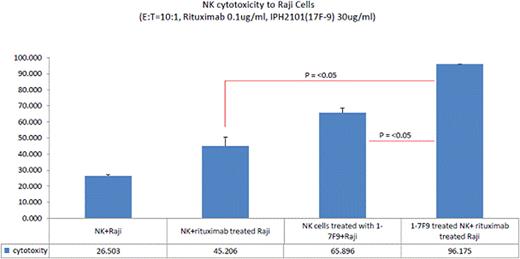Abstract
Abstract 2706
Poster Board II-682
Follicular lymphoma is incurable with the current chemo- or chemoimmunotherapy with median survival of 8–12 years. Relapse free survival after each subsequent therapy steadily decreases, resulting in an expected median survival of 4.5 years following initial relapse. Hence new treatment strategies are needed. Natural killer (NK) cells are important effector cells in mediating the anti-lymphoma effect of rituximab. Indeed, antibody-dependent cell-mediated cytotoxicity (ADCC) is a major mechanisms of action of rituximab with NK cells being important effector cells. However, in addition to ADCC, NK cells also exert natural cytotoxicity against tumor cells, which is modulated by a balance of inhibitory and activating signals through NK cell receptors. NK cell function is inhibited when their inhibitory killer immunoglobulin-like receptors (KIR) are ligated by their cognate MHC class I antigens on tumor targets. The novel agent IPH2101 (1-7F9) is a fully human monoclonal antibody directed against KIR2DL receptor that blocks the interaction of KIR with its HLA-C ligands breaking NK cell tolerance to autologous tumor cells. We investigated whether the combination of the IPH2101and Rituximab will augment the NK cell mediated cytotoxicity against CD20+ lymphoma targets as compared to rituximab alone.
Raji cells are human CD20+ Burkitt lymphoma cell line cells that expresses HLA-A*03,- (ligand to inhibitory KIR3DL2); -B*71[Bw6] (no inhibitory KIR-Ligand) and -Cw*03,w*04 (group 1 and 2 of HLA-C ligands to inhibitory KIR2DL2/3 and KIR2DL1), and were chosen for study because they have HLA-C antigens that ligate the inhibitory KIR2DL2/3 and KIR2DLI receptors, making them a good target to test our hypothesis of inhibiting inhibitory KIR. NK cells were isolated from normal donor PBMC (peripheral blood mononuclear cells) with the Miltenyi NK isolation Kit. Using LDH release based cytotoxicity assay, we show (Figure 1) that the treatment of target Raji cells with Rituximab significantly enhanced natural cytotoxicity of the purified NK cells against Raji cells. IPH2101alone treatment of NK cells also significantly enhanced the cytotoxicity of Raji cells, however, the combination of IPH2101treated NK cells against Rituximab treated Raji cells significantly enhanced cytotoxicity beyond that observed with each agent alone. Effector: Target (E:T) ratios of 14:1 or less, from more than 5 random donors showed similar results indicating a synergistic, or at least and additive effect ( representative experiment shown Figure 1) . In these experiments purified NK cells were treated with 30ug/ml of IPH2101for 30 min and Raji targets were treated with 0.1-30ug/ml of Rituximab for 30 min. NK cells in the presence or absence of IPH2101were co-cultured with Raji cells in the presence or absence of Rituximab for 4 hour in a 96 well plate. NK cytotoxicity was assessed with an LDH release based assay. Our results suggest that there is a positive cooperation between natural cytotoxicity mediated through KIR-MHC blockade and that mediated by ADCC. Indeed, wee have shown that the blockade of KIR-MHC class I interaction by anti-KIR blocking antibody (IPH2101) augments the cytotoxicity of freshly isolated normal donor NK cells against CD20+ lymphoma cell lines as compared to rituximab alone, providing a rationale for the clinical investigation of the combination of IPH2101 (1-7F9) and rituximab in non-Hodgkin's lymphoma
Squiban:Innate pharma: Employment.
Author notes
Asterisk with author names denotes non-ASH members.


This feature is available to Subscribers Only
Sign In or Create an Account Close Modal